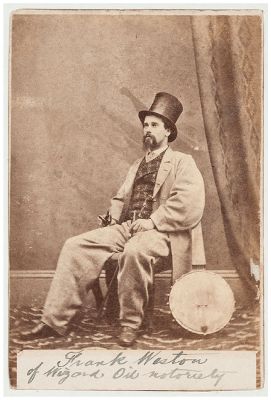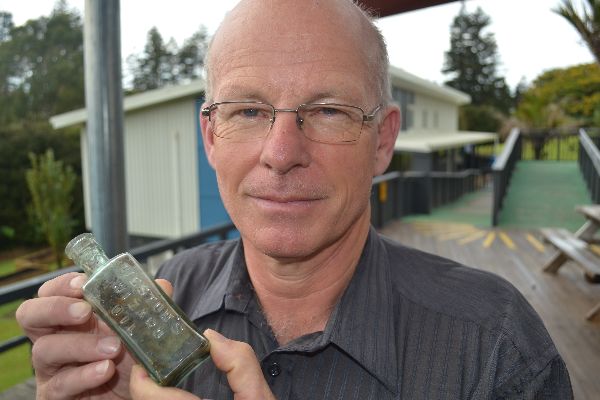Salesman Of ‘good Oil’ Had Plenty Of Bottle
An artefact from the Kerikeri Mission Station
collection which harks back to an earlier, more deregulated
era of medical healthcare will soon be going on
display.

The spotlight recently fell on an empty glass bottle that once contained a medicinal concoction known as Weston’s Wizard Oil – an intriguing elixir that has posed more questions than answers.
After careful observation and a little research, Heritage New Zealand Pouhere Taonga Northland archaeologist, Dr James Robinson, promptly diagnosed a severe case of quackery from a less medically enlightened time.
“The Weston Wizard Oil brand was a very big clue indeed,” says James.
Known as the ‘Wizard Oil Prince’, Frank Weston toured Australia and New Zealand from the 1860s to the 1880s pedalling his bogus health tonic on the road. The presence of the bottle in the Kerikeri Mission Station collection is not a complete surprise – given Weston’s profile and his no doubt impressive market share in quack remedies at the time – but it also raises questions.

“Did Weston come up to Kerikeri, for example, or did someone travelling from out of town bring this bottle with them? It would be really interesting to know,” he says.
When Frank Weston came to town it was usually quite an occasion. Described by one observer as “a comical card possessing a great amount of dry Yankee wit, humour and assurance”, Weston was known for his ability to draw – and work – a crowd. By ‘assurance’ the observer probably meant confidence; by confidence he probably meant ‘con man’.
“Weston’s modus operandi was to put on a show featuring himself telling tall tales, humorous anecdotes and of course testimonies illustrating the efficacious nature of his remedies. He also sung songs accompanying himself on the banjo. One of these was entitled – rather unsubtly – I’ll Take Another Bottle or Two.”
“He drew crowds, which he then proceeded to milk in a very clever way.”
Every audience member received a copy of his book lengthily entitled Frank Weston’s Australian Companion: A Selection of Valuable Recipes for Cooking. &c with Much Information about Horses, Cattle, Social, Witty and Other Important Subjects.
In addition to the wide range of human endeavour listed in its title, the book also included information about the remedies Weston was pedalling which, in addition to his Wizard Oil, included Weston’s Magic Pills and the intriguingly named Mexican Mustang Liniment.
Not that you needed anything more than Weston’s Wizard Oil. According to the promotional material, Weston’s Wizard Oil taken either internally or externally – your choice – was a cure-all for such ailments as rheumatism, sciatica, gout, neuralgia, cholera, spasms, headache, coughs and colds, tumors, ulcers, scrofula, diseased liver, piles, swellings and wounds, and ‘relaxed state of the bowels’.
“Travelling ‘snake oil salesmen’ as they became known were a feature of life in the United States, Australia and New Zealand, though Frank Weston was certainly one of the better known in this part of the world,” he says.
“The cost of a bottle of Mr Weston’s elixir in New Zealand was advertised at half a crown – which was fairly pricey for those days. The health benefits were at best questionable.”
In 1917, however, the South Australian police caught up with Weston, and accused him of manufacturing his Wizard Oil in part from wood-derived methylated spirits – a breach of the Commonwealth Spirits Act 1905. Penalty for conviction was a potentially ruinous £100 to say nothing of the complete loss of his business – a prospect guaranteed to reinvigorate the most relaxed of bowels, though Weston was later found to be not guilty at trial and the case was dismissed.
Weston could possibly have added ‘legal immunity’ to the long list of other benefits his Wizard Oil provided, though that may have been a bit much – even for him.
“The bottle reminds us of an intriguing aspect of life in the second half of 19th Century New Zealand and gives us a picture of one of those larger-than-life characters who made his living in a way that was unorthodox to say the least,” says James.
People can see the – mercifully empty – bottle at the Kerikeri Mission Station.


 Gordon Campbell: On The Hikoi Aftermath
Gordon Campbell: On The Hikoi Aftermath Mana Mokopuna: Children And Young People Share Vital Insights On Healing From Family Violence And Sexual Violence In New Report
Mana Mokopuna: Children And Young People Share Vital Insights On Healing From Family Violence And Sexual Violence In New Report NZ Government: PM Marks One Year In Government
NZ Government: PM Marks One Year In Government Helen Clark Foundation: Helen Clark Foundation Calls For Political Action To Reduce The Prevalence Of Junk Food And Improve Health Outcomes
Helen Clark Foundation: Helen Clark Foundation Calls For Political Action To Reduce The Prevalence Of Junk Food And Improve Health Outcomes Justice Committee: Further Decisions About Submissions Process For The Principles Of The Treaty Of Waitangi Bill
Justice Committee: Further Decisions About Submissions Process For The Principles Of The Treaty Of Waitangi Bill Infrastructure New Zealand: Single Agency Needed To Coordinate Climate Adaptation And Recovery
Infrastructure New Zealand: Single Agency Needed To Coordinate Climate Adaptation And Recovery Free Speech Union: Fair Digital News Bargaining Bill Likely To Restrict Access To Information, Polling Shows Most Oppose
Free Speech Union: Fair Digital News Bargaining Bill Likely To Restrict Access To Information, Polling Shows Most Oppose


